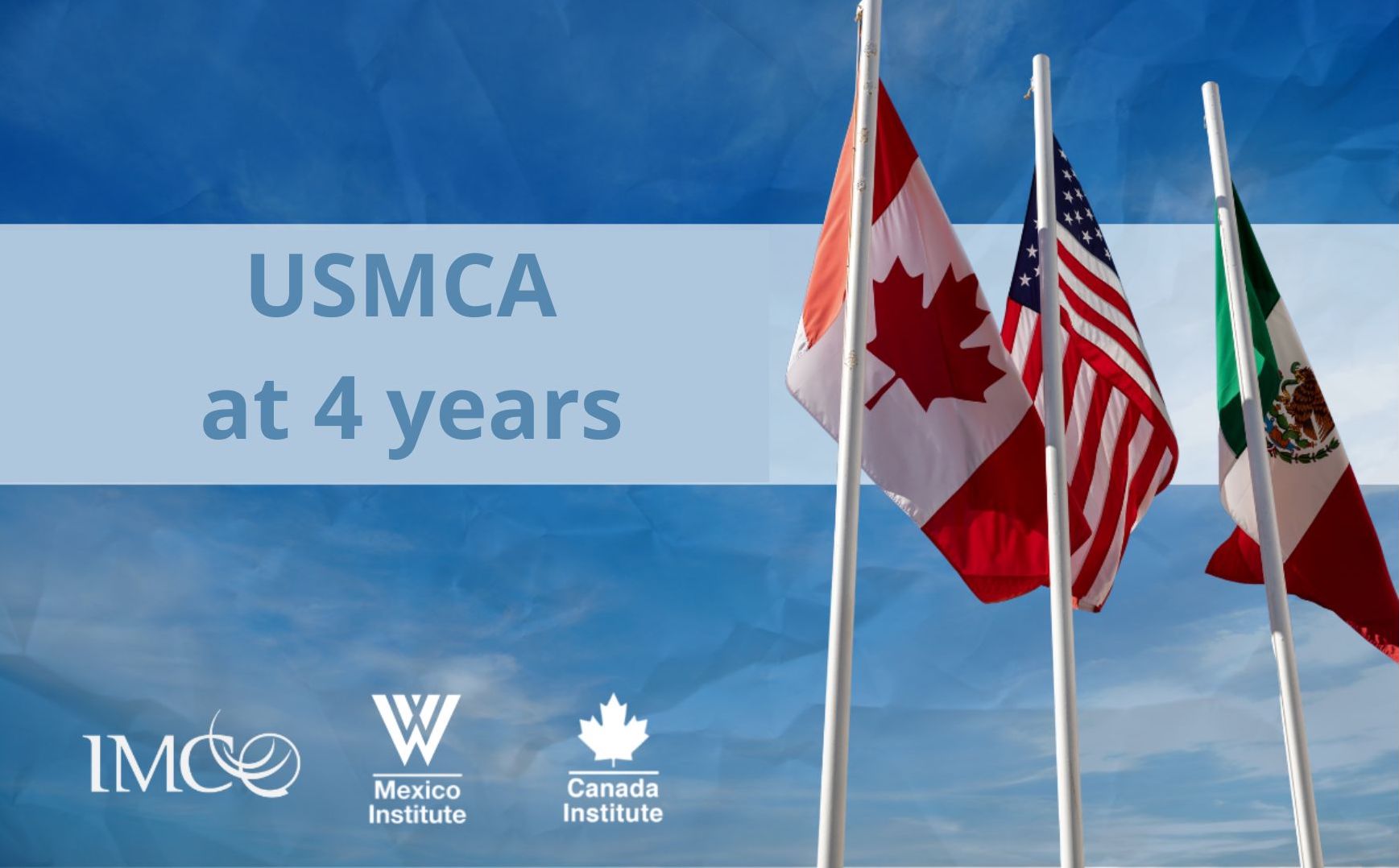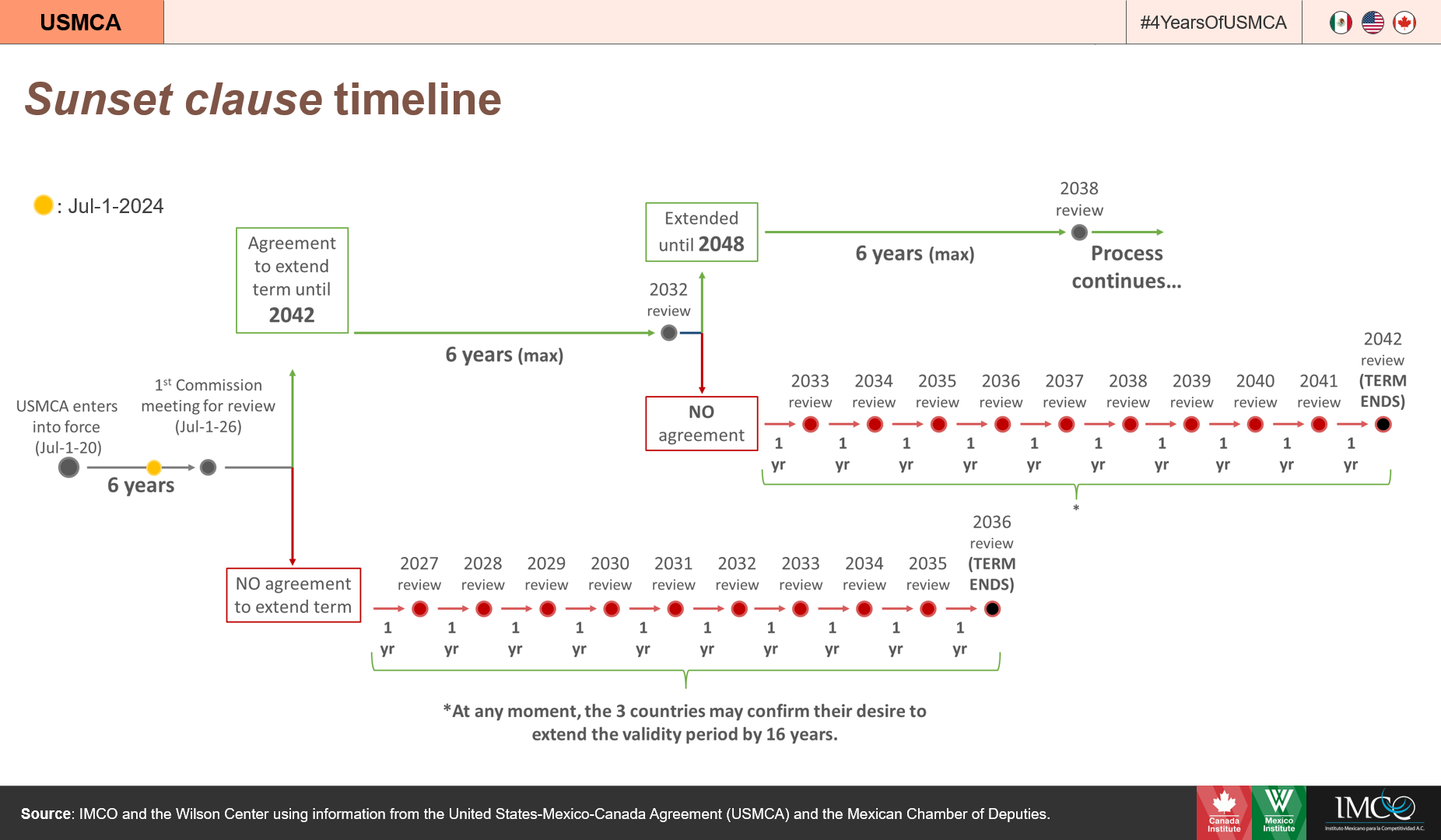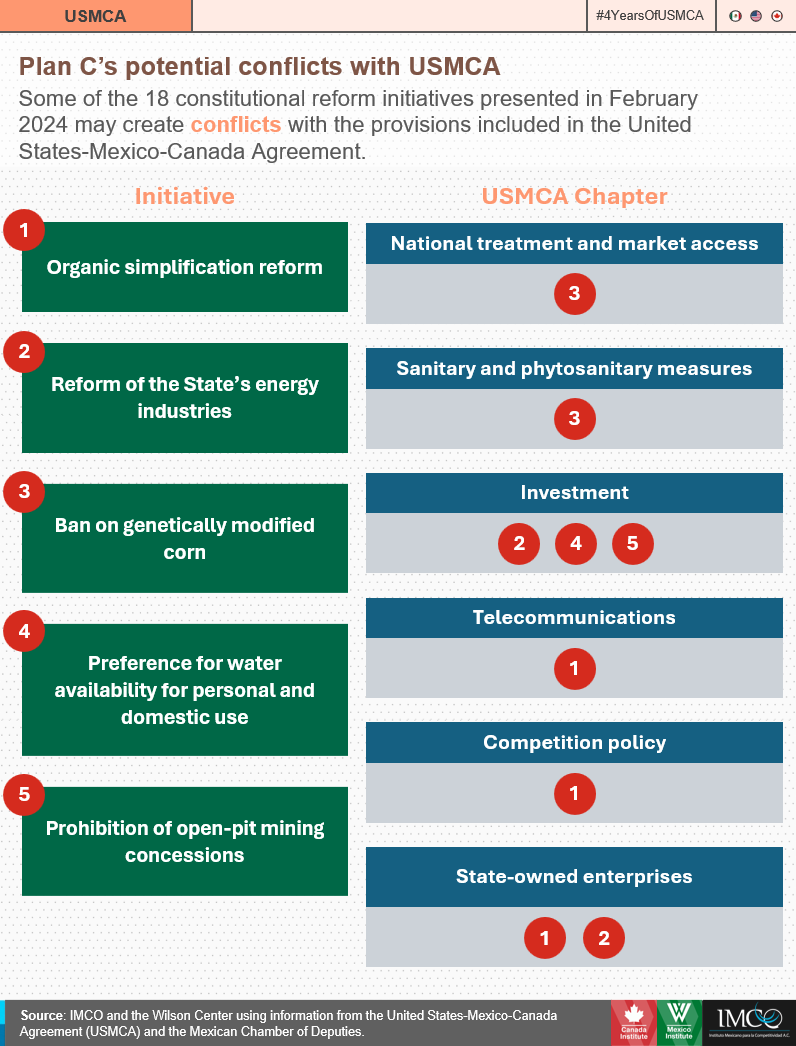
IMCO and Wilson Center assess USMCA four years down the road
The United States–Mexico–Canada Agreement (USMCA) celebrates its fourth anniversary on July 1. The USMCA modernized the 1994 North American Free Trade Agreement (NAFTA) and gave continuity to the regulatory framework of the trade relationship between Mexico, the United States and Canada.
With four years elapsed, the agreement is two years away from its first review by the governments of Canada, Mexico and the United States, as established in the agreement’s sunset clause. Currently, the USMCA is set to expire in July 2036. At the next review in July 2026, the countries may decide to extend the agreement’s current validity period by six years, i.e. until 2042. If they decide not to extend, they will have to conduct annual reviews until the original term expires in 2036.

This context highlights the importance of ensuring that Mexico, the United States, and Canada comply with the commitments established in the USMCA. Doing so will help maintain the stability that the agreement's regulatory framework provides to the trilateral trade relationship. This stability has allowed Mexico and Canada to increase their roles as suppliers of U.S. imports and to surpass the amount of U.S. imports from China.
Trilateral issues: active cases of controversy
A crucial element for a successful USMCA review in 2026 is resolving the ongoing State-to-State disputes under its rules. To date, the dispute settlement mechanism has been activated seven times across various sectors: dairy, automotive, energy, agricultural biotechnology, and solar panel production. In four cases, the panels concluded their investigations and submitted Final Reports. Of the remaining cases, one has an established panel, while two others —related to Mexico's energy policies— remain in the consultation stage.
The active cases are as follows:
1. Energy policy and measures in the electricity sector (two cases)
- Start date: July 20, 2022
- Complainant country: United States
- Respondent country: Mexico
- Current status: In process of consultation
- Dispute: The United States alleges that the implementation of policies in the Mexican energy sector negatively impact U.S. and Canadian companies in said sector to the benefit of the Federal Electricity Commission (CFE) and Petróleos Mexicanos (Pemex). These include 1) the proposed reform to the Electricity Industry Law in March 2021 -which was declared unconstitutional by the Supreme Court in February 2024-, 2) delays in permits for private companies in the energy sector, 3) the extension granted to Pemex in the period granted to comply with low-sulfur diesel supply requirements, and 4) actions regarding the use of Mexico's natural gas transportation service.
- Additional case: On the same date, Canada initiated a parallel process to the one requested by the United States on the same issue with Mexico as the respondent country.
2. Measures related to genetically modified corn
- Start date: June 2, 2023
- Complainant country: United States
- Respondent country: Mexico
- Current status: In process of investigation by an expert panel.
- Conflict: The U.S. government argues that three measures conflict with the provisions of USMCA: 1) the rejection of applications for authorization to import Genetically Modified Organisms (GMOs), including genetically modified (GMO) corn; 2) Mexico's decision to ban (GMO) corn for nixtamalization and flour production; and 3) Mexico's decision to gradually substitute (GMO) corn for uses related to human consumption and for fodder (animal feed) without presenting scientific evidence.
Mexico in the spotlight: Plan C and its risks for North American competitiveness
In addition to the currently active dispute settlement cases, the USMCA’s performance faces potential challenges related to actions by the Mexican government, specifically by a series of constitutional reform initiatives that will be presented to the new legislature taking office in September 2024.
Of the 18 proposed initiatives, five could potentially violate provisions included in USMCA’s chapters:
1. Organic simplification reform
-
-
- Proposal: Extinguish autonomous agencies, including the Federal Economic Competition Commission (COFECE), the Federal Telecommunications Institute (IFT) and the Energy Regulatory Commission (CRE). It intends to incorporate their activities to the Executive Branch in agencies such as the Ministry of Economy or the Ministry of Energy.
- Potential conflicts with USMCA:
- By eliminating these autonomous agencies and incorporating their activities into the Executive Branch, the reform could conflict with the following chapters:
- Chapter 18 (Telecommunications): establishes the obligation to maintain a regulatory agency for the sector that is independent and autonomous from the Executive Branch.
- Chapter 21 (Competition policy): states that each country must maintain a national authority, or authorities specifically dedicated to the enforcement of competition laws.
- Chapter 22 (State-owned enterprises): establishes that administrative bodies regulating state-owned enterprises (including those in the energy sector) must be impartial.
- By eliminating these autonomous agencies and incorporating their activities into the Executive Branch, the reform could conflict with the following chapters:
-
2. Reform of the State's energy industries
-
-
- Proposals: 1) eliminates Mexico’s Energy Regulatory Commission (CRE); 2) limits Mexico’s Federal Electricity Commission’s (CFE) ability to enter into contracts with private companies in electrical transmission and distribution and; 2) establishes CFE’s precedence over private companies.
- Chapter 14 (Investment): the "ratchet clause" in USMCA ensures that if a country further opens its economy by allowing more trade or foreign investment, it cannot reverse those measures or close previously opened sectors to private participation. Introducing new restrictions for private companies in the energy sector could, therefore, conflict with USMCA.
- Proposals: 1) eliminates Mexico’s Energy Regulatory Commission (CRE); 2) limits Mexico’s Federal Electricity Commission’s (CFE) ability to enter into contracts with private companies in electrical transmission and distribution and; 2) establishes CFE’s precedence over private companies.
-
3. Ban on (GMO) corn
-
-
- Proposal: To declare the country free of genetically modified corn, including (GMO) corn, for planting and human consumption.
- Potential conflicts with USMCA:
- By imposing trade restrictions without presenting scientific evidence, the reform would be in conflict with commitments included in USMCA.
- Chapter 2 (National treatment and market access): establishes that no arbitrary restrictions may be placed on trade in goods.
- Chapter 9 (Sanitary and phytosanitary measures): states that sanitary and phytosanitary measures -such as restrictions on imports of agricultural goods- must be based on scientific recommendations.
- By imposing trade restrictions without presenting scientific evidence, the reform would be in conflict with commitments included in USMCA.
-
4. Preference for water availability for personal and domestic use
- Proposal: Not to grant concessions to individuals in areas with low water availability in quantity and quality and only authorize allocations to public entities for personal consumption and domestic water use.
- Potential conflicts with USMCA:
- Chapter 14 (Investment): includes National Treatment and Most-Favored Nation Treatment provisions that prohibit preferential treatment of public enterprises over private investors from other countries.
5. Prohibition of open-pit mining concessions
-
- Proposal: Prohibit the granting of concessions for mineral exploration and exploitation in open-pit mining. Existing concessions would not be affected.
- Potential conflicts with USMCA:
- Chapter 14 (Investment): includes National Treatment, Most-Favored-Nation Treatment and Minimum Standard of Treatment provisions that prohibit preferential treatment of state-owned enterprises over private investors from other countries. The Minimum Standard of Treatment clause of the USMCA protects investors against measures that could affect their operations and ownership. The proposed reform could violate the commitment to maintain the openness conditions agreed to when signing the agreement, which could result in arbitration claims or trade sanctions by Canada or the United States.
In a year with a change in federal government in Mexico and presidential elections in the United States, and with the possibility of institutional changes and modifications in regulations and public policy, resolving pending disputes and aligning regulatory frameworks among the three USMCA countries is crucial.

Actions such as introducing constitutional or legal reform initiatives that may conflict with the USMCA, or generate uncertainty and diminish legal certainty, affect regional competitiveness. As the first USMCA review approaches, aligning public policies between Mexico, the United States, and Canada will be essential. Fully implementing the agreement is vital to ensure its longevity and enable the countries to fully benefit from its provisions.
